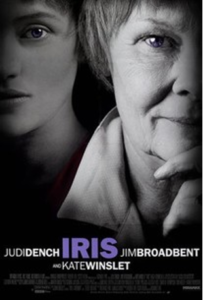
Iris (2001)
Directed by Richard Eyre from a screenplay he co-wrote with Charles Wood
Starring Judi Dench, Kate Winslet, Jim Broadbent, and Hugh Bonneville
Based on John Bailey’s 1999 memoir, Elegy for Iris, the film looks back on his relationship with his wife, Iris Murdoch. It takes us from their early days, when Murdoch was an outgoing, freethinking intellectual and Bailey was a shy young professor, to their final days together, when Murdoch was virtually helpless, suffering from Alzheimer’s.
I watched the movie because I’ve always wanted to read Murdoch, ever since DK, a former colleague of mine at the University of Chad, recommended her to me. I read a few short stories and a couple of essays, but nothing more over the years. I felt vaguely guilty about that. And so when I saw the movie listed on Netflix, I thought I should watch it. And so I did.
It’s not a great movie, but it’s quite a good one. The story of the relationship is irresistible and heart wrenching. And the portrait of Murdoch, so capably played by both Dench and Winslet (as the young Iris), was so fascinating that I decided to read more about her and read one of her novels.
She wrote about two dozen novels. I chose The Sea, The Sea, which won the Booker Prize in 1987. (See below.)
Interesting Fact: For his role as John Bayley, Jim Broadbent won the Oscar for Best Supporting Actor at that year’s Academy Awards. The film also picked up nominations for Judi Dench (Best Actress) and Kate Winslet (Best Supporting Actress)
From Washington Post: “Not just a fitting document of a life brilliantly lived but a vibrant, almost palpitating piece of cinema.”
From Rotten Tomatoes: “[A] solidly constructed drama, Iris is greatly elevated by the strength of its four lead performances.”
